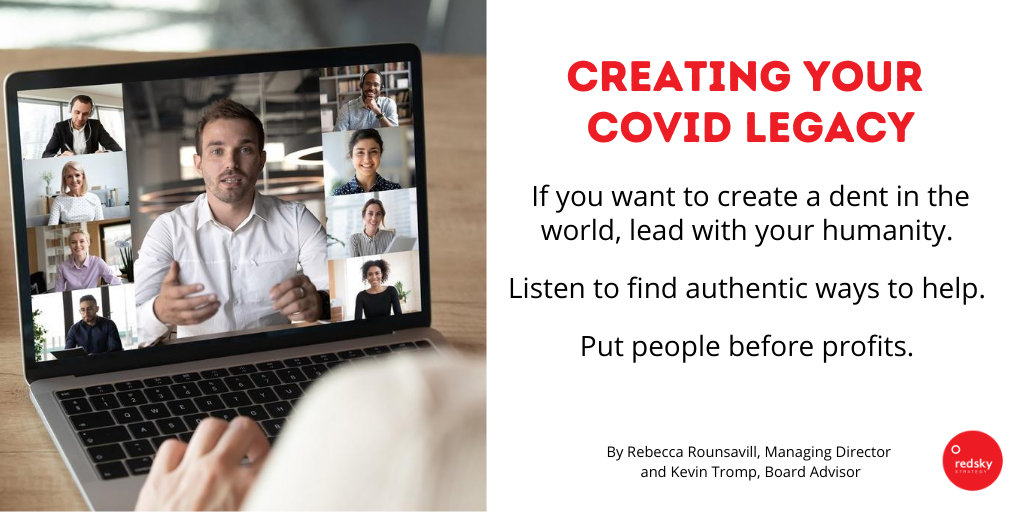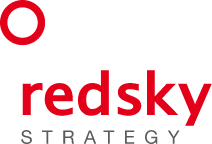News
Creating Your COVID Legacy

By Rebecca Rounsavill, Managing Director and Kevin Tromp, Board Advisor
Steve Jobs famously talked of putting a dent in the universe, and he certainly left an impact. But it has taken a tiny virus, measuring just 0.125 microns, to create the biggest dent of the century thus far.
As we negotiate the attendant risks, financial hardships, and shifts in the personal and business landscape that we’re living through due to COVID-19, it is clear that this will be a stubborn dent to repair — one not easily fixed by a hammer, spray paint or other superficial measures. It is going to require a completely new set of capabilities, along with resilient, open minds to withstand the tumult, and move organizations forward to meet the new and redefined challenges.
This tiny virus has left our common fragility exposed, leaving both our customers and staff feeling vulnerable and unsettled. In this environment, a focused commitment to business transformation may no longer be sufficient; what is needed is a focus on humanity, a focus on manifesting authentic care, and a focus on assuaging that feeling of vulnerability.
So what does it mean to show authentic care? How do we, as people and as leaders, learn to draw on our humanity to make a positive difference? To become someone who inspires and makes their business and community better? To become someone who does the right things, knowing that the right things will create a long-term competitive advantage, but may in the short term be costly?
1) Listen. Active listening will enable you to empathize with your customers and employees. Focus on what they are saying as well as what they are doing. Hold your initial thoughts and seek to understand — to ask questions, reflect, and find the insights behind the action. Deep listening precipitates deep connections — and connections are everything. Early in the coronavirus crisis, consumers were hoarding toilet paper. And the team behind Cottonelle, the toilet paper brand, listened — they understood that people were afraid. What if plants closed, leaving them without access to toilet paper? They learned that there was a guilt from hoarding, and a knowledge that people could be hurting their neighbors. So Cottonelle created the “share a square” ad, easing fears by promising that there would be enough toilet paper, while creating an uplifting message about giving. This ad will likely not serve to increase sales in the short term, but will increase long term-value for the brand with more loyal customers.
2) Identify authentic ways to help. Here, an innovation mindset comes in handy. Where others get scared in a crisis, those with an open mindset think of the opportunities. How can I use my capabilities to add value in a new way to my customers? How can I help people do things differently? In the first quarter of 2020, Nike was facing a huge drop in sales in China, as 5,000 of its roughly 7,000 directly-owned and partner-operated stores closed due to the pandemic. Sales were starting to drop through the floor, and the initial instinct, in many cases, would be to cut costs. But the team at Nike quickly noted a shift in workout habits. People were trying to do workouts from home — even those in small homes. The brand realized that it could amp up its offerings on its workout apps (like the Nike Training Club). The brand created new programs that let workout in small spaces and offered its app FREE OF CHARGE at a time when they could potentially have doubled prices. Sign-ups increased 80% across its activity apps. “The strong engagement of Chinese consumers with our activity apps translated into strong engagement with our Nike commerce app,” said Nike CEO John Donahoe. Online sales in China “approached triple digit growth,” and with that, sales stabilized.
3) Give if you can. There have been glimmers of hope in this crisis that we can work together as a nation and help people in need. One of the unifying forces has been the support for our healthcare workers. Communities across the nation have provided food for healthcare workers — food purchased through local restaurants, helping both organizations in the process.
Crocs offers another example. Crocs sales were up at the start of the pandemic like they haven’t been in years. Consumers were craving comfort, and Crocs delivered. Rather than milk the profits, the company joined the effort to help healthcare workers, donating over 860,000 pairs of Crocs to the relief effort and winning the hearts of some of their most loyal customers.
Now is not the time to panic and slash spending — if you want to create a dent in the world, lead with your humanity. Listen to find authentic ways to help. Put people before profits. It is the right thing to do in the short term — even if the payout is long-term.
